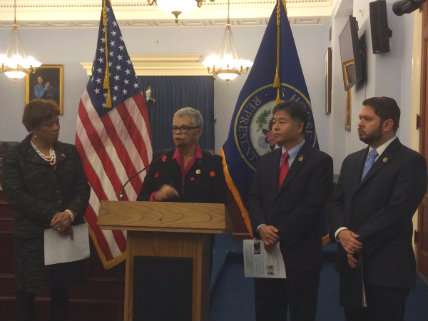U.S. Reps Seek to End Money Bail in America
"We cannot both be a nation that believes in the principle of innocent until proven guilty, yet incarcerate over 450,000 Americans who have not been convicted of a crime," says Rep. Ted Lieu.

One of the lesser talked-about tragedies of the U.S. criminal justice system is how disruptive an arrest on even the most minor charges can be if someone doesn't have the money to pay bail. A team of freshman representatives in the U.S. House are now seeking to change that, with the "No Money Bail Act of 2016." Introduced Wednesday, the legislation would eliminate the use of money bail in the federal justice system, as well as encourage states to stop using money bail as a pretrial release condition by barring those that do from certain Department of Justice (DOJ) grants.
"We cannot both be a nation that believes in freedom and equal justice under the law, yet at the same time, locks up thousands of people solely because they cannot afford bail," said Rep. Ted Lieu (D-Calif.), sponsor of the bail-reform bill, in a statement. "We cannot both be a nation that believes in the principle of innocent until proven guilty, yet incarcerate over 450,000 Americans who have not been convicted of a crime."
"Many people decide to plead guilty purely to get out of jail because they cannot afford bail," Lieu continued. "America should not be a country where freedom is based on income. We are better than this."
According to DOJ's Office for Access to Justice (ATJ), roughly 60 percent of the people in U.S. jails are pretrial defendants, up from 50 percent in 1996 and 40 percent in 1986.
"Bail, like many aspects of the criminal justice system, changed in the 1980s and 1990s in ways that policy makers only now see as deeply troubling," said ATJ Director Lisa Foster in a speech earlier this month. Citing a 1965 University of Pennsylvania Law Review article titled "The Coming Constitutional Crisis in Bail," Foster complained that we have known about this problem for more than 60 years and yet done little to nothing to remedy it.
But Foster thinks the country is at a "tipping point" on bail reform, finally. "The Justice Department has been actively advocating bail reform in the states for many years," she said.
Lieu's co-sponsors on the No Money Bail Act are Reps. Bonnie Watson Coleman (D-N.J.), Brenda Lawrence (D-Mich.), and Ruben Gallego (D-Arizona). Coleman said the current bail system has "debilitating costs for our communities and our budgets." Lawrrence called it a "misuse of resources" and "a massive drain on valuable tax dollars."
Some Americans have been held in jail "for days, weeks, months, and even years before their cases are heard," said Lawrence. And "people stuck in jail while awaiting trial face far greater pressure to accept plea bargains. With each day they are denied bail, they face a greater risk of losing their jobs, custody of their children, and other rights that, ironically, can be later used against them in court."
According to ColorofChange.org director Rashad Robinson, black Americans face 35 percent higher bail than whites do when held on the same charges. Robinson noted that Sandra Bland and Kalief Browder both died in jail "because of their inability to afford bail."
The No Money Bail Act is endorsed by the American Civil Liberties Union (ACLU), The Pretrial Justice Institute, The Drug Policy Alliance, The Sentencing Project, The National Legal Aide & Defender Association, and the National Association of Pretrial Services Agencies (NAPSA). NAPSA head Penny Stinson said her association has long opposed the current bail system becayse "money bail inherently discriminates against the poor and removes the decision about actual release from custody from the court to profit-motivated entities." It "has no place in an evidence-based pretrial system." Jo-Ann Wallace of the National Legal Aide & Defender Association hopes the bill will emphasize "the critical place of bail reform within the broader criminal justice reform movement."


Show Comments (179)